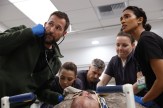Law graduates urged to protect the future of the legal system

In a Commencement ceremony on Friday afternoon at Matthews Arena, peers, professors, and public figures challenged more than 200 graduating students from the School of Law to shape the future of the legal system and take professional risks for the sake of justice.
President Joseph E. Aoun presided over the Commencement exercises. New Hampshire Governor Margaret Wood Hassan, a 1985 graduate of the School of Law, delivered the Commencement address and received an honorary doctorate of laws. School of Law Dean Jeremy R. Paul, law professor Lucy Williams, and three students—Kevin William Manganaro, Cody L. Thornton, and Seda Akay Onur—also delivered remarks.
Prior to delivering his charge to the graduates, Aoun acknowledged the passing of law professor Daniel Schaffer, who joined the faculty in 1970 and spent 40 years teaching and researching in the tax field.
He then challenged the graduates to protect and shape the future of the law, which he characterized as a pillar of our democracy.
“The law is not made of concrete or stone, but instead is a malleable force that changes with the times,” Aoun told the graduates, many of whom will soon head to courtrooms, boardrooms, NGOs, or governmental agencies. “You will be the ones to lead those changes in the law.”
Aoun pointed to the graduates’ groundbreaking work through the Civil Rights Restorative Justice Project as but one example of their commitment to protecting the future of the legal system. By working tirelessly to address the damage done by racial hate crimes during the Civil Rights era, he explained, the “CRRJ is restoring our faith that the rule of law is there as a pillar, upholding our democracy.”
He noted that the Boston Marathon bombings highlighted the community’s faith in the rule of law. “Even in the throes of our shock and grief, we believed that the law would work to find those responsible,” he said. “With the remaining suspect apprehended, it is up to the lawyers to take over. Once again, we will trust the rule of law to bring those responsible to justice.”
In her remarks, Hassan highlighted the role of co-op in her development as both a citizen and lawyer. “It brought a perspective to my legal education that was lacking elsewhere and helped me learn that law is about real lives and not just intellectual principles,” said Hassan, who worked on co-op at the National Prison Project of the American Civil Liberties Union. “The combination of classroom and real-world experience better prepares us to navigate the challenges we face in our lives both personally and professionally.”
Throughout her illustrious career in public service, Hassan has championed government as an active partner in solving the complex challenges confronting her state and the New England region.
First as a state legislator, and now as the Granite State’s second-ever female governor, Hassan’s leadership has been marked by her ability to bring people together to find common ground around core issues such as education, healthcare, and jobs.
She urged the graduates to make their own indelible mark on the world by exercising good judgment and honing it through both experience and education. “Your judgment is strongest when you integrate all aspects of who you are,” she said. “The more difficult experiences you have, and the more exploring you do, the better your judgment becomes.”
“Each of you is poised to help lead the way to the next chapter of progress,” she added. “You need to be engaged in citizen democracy that drives us forward.”
Paul echoed Hassan’s belief in the power of experiential learning, commending the graduates for amassing more legal experience than students at any other law school in the country through the university’s signature co-op program. Over the last three years, they have completed more than 300,000 hours of legal work at some 880 companies in 12 countries on five continents throughout the world.
“You have done more than master legal analysis,” Paul told the graduates. “You have learned that if two parties have a disagreement, the odds are that both sides have a point. You have learned that pictures are worth a 1,000 words and so, too, is a good example. In short, you have learned to think like a lawyer.”
He laid out a four-point plan for the law graduates to find meaningful work in a harsh job climate, urging the soon-to-be-lawyers to read newspapers, embrace technology, and rely on Northeastern’s network of faculty and alumni for support. Fields ranging from education to finance, he said, would always need lawyers to achieve their goals.
“You are a diverse, well-educated, and workplace-tested group of soon-to-be lawyers with an extraordinary amount to offer,” he said. “Your country needs you.”
Williams praised the graduates for persevering through law school’s grueling curriculum and encouraged them to take risks in spite of the fear of failure.
She noted that loss in the field of law is inevitable, pointing to the possibility of representing a client who will be executed or murdered by an abusive spouse. “When you believe you have failed, you do not have an excuse to withdraw,” she told the graduates. “You have to process the pain, transcend the fear, and continue to critique our legal system and society.
“In the face of fear and pain and the unknown,” she added, “you must take incredible risks for what you believe is right.”
All three student speakers thanked their classmates and professors for helping them reach this milestone moment.
“We’ve functioned as a unit and supported one another,” said Manganaro, who spent several years in the theatre business before enrolling in law school. “It’s my sincere hope that we can take this spirit of community forward with us.”
Onur spoke on behalf of the 11 graduating students in the Master of Laws program, eight of whom grew up outside of the United States. “Here we stand today, coming from every corner of the world,” said Onur, who grew up in Turkey, where she was a junior level lecturer of Constitutional Law. “We were nervous during our first classes last fall quarter, not only because of the subject matter, but also for fear of making mistakes while talking in English. Somehow, though, we managed to deal with our ‘stage fright,’ and completed all of our classes. I would say that is a kind of success story.”
Cody L. Thornton, who served in the Peace Corps and worked with USAID in Kazakhstan prior to Northeastern, encouraged his peers to develop their own mechanisms for measuring change, improvement, and success. “We may no longer have kings and queens, but we need to still overthrow our rulers,” he explained, referring not to people, but to procedure. “Choose your own metrics,” he said, “and push forward into the future.”





